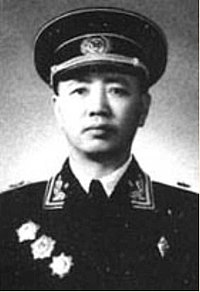Liu Huaqing
Liu Huaqing | |
|---|---|
| 刘华清 | |
 Liu Huaqing in 1955 | |
| Vice Chairman of the Central Military Commission | |
| In office State Commission: 28 March 1993 – 5 March 1998 Party Commission: November 1989 – 18 September 1997 | |
| Chairman | Jiang Zemin |
| Personal details | |
| Born | October 1916 Huang'an, Hubei, China |
| Died | January 14, 2011 Beijing |
| Political party | Communist Party of China |
| Children | Liu Zhuoming |
| Liu Huaqing | |||||||
|---|---|---|---|---|---|---|---|
| Traditional Chinese | 劉華清 | ||||||
| Simplified Chinese | 刘华清 | ||||||
| |||||||
Liu Huaqing (Chinese: 刘华清; October 1916 – January 14, 2011) was a general of the Chinese People's Liberation Army. He served as Commander of the PLA Navy from 1982 through 1988, and is considered to have greatly contributed to the modernization of the Chinese Navy.
He had outlined a three-step process by which China would have a navy of global reach by the second half of the 21st century. In step one, from 2000 to 2010, China would develop a naval force that could operate up to the first island chain. In step two, from 2010 to 2020, China's navy would become a regional force capable of projecting force to the second island chain. In step three, to be achieved by 2040, China would possess a blue-water navy with the aircraft carrier as its centerpiece.[1] He was a strong advocate of the future Chinese aircraft carrier program.
During the 1960s and 1970s, Liu was responsible for naval research and development before heading national military research.[2] He was also the top commander of the troops enforcing martial law to suppress the Tiananmen Square protests in June 3–4, 1989.[3] From 1992 to 1997 Liu was a member of the Politburo Standing Committee. He was the last Standing Committee member of a military background. Since he left the Standing Committee in 1997, no other military leader has sat on the committee.
Liu died on January 14, 2011 in Beijing.[4]
Liu Huaqing's son, Liu Zhuoming, is a vice admiral of the PLA Navy.[5]
References
- ^ Dooley, Howard J. (Spring–Summer 2012). "The Great Leap Outward: China's Maritime Renaissance". The Journal of East Asian Affairs. 26 (1). Institute for National Security Strategy: 71 – via JSTOR.
{{cite journal}}: Unknown parameter|subscription=ignored (|url-access=suggested) (help) - ^ Winterford, David (Winter 1993). "Chinese Naval Planning and Maritime Interests in the South China Sea: Implications for U.S. and Regional Security Policies". The Journal of American-East Asian Relations. 2 (4). Brill Publishers: 377. ISSN 1058-3947 – via JSTOR.
{{cite journal}}: Unknown parameter|subscription=ignored (|url-access=suggested) (help) - ^ 吴仁华. 《六四事件中的戒严部队》. 真相出版社. 2009.
- ^ "China's former military leader passes away". People's Daily Online. January 14, 2011. Retrieved January 14, 2011.
- ^ Becker, Jeffrey; Liebenberg, David; Mackenzie, Peter (December 2013). "Behind the Periscope: Leadership in China's Navy". Defense Technical Information Center. p. 176.
External links
- Template:Zh icon Biography of Liu Huaqing
- Ruminations about how little we know about the PLA Navy. Conference on Chinese Military Affairs, October 10, 2000
- 1916 births
- 2011 deaths
- People's Liberation Army Navy admirals
- Chinese military writers
- Chinese military personnel of World War II
- People's Republic of China writers
- People from Xiaogan
- Writers from Hubei
- Members of the Politburo Standing Committee of the Communist Party of China
- Chinese military personnel stubs
